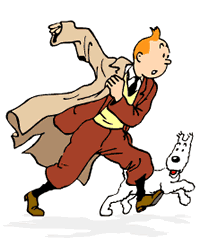 Imagine a time in the not-so-distant future when we have lost the ability to conceive children. Blame it on pollution, on science, on God -- some people are beyond pointing fingers, now, and they're simply trying to deal with the imminent demise of the human race. The world has, essentially, erupted in war and violence. England has sealed its borders and, in an effort to cleanse itself, is deporting any and all illegal immigrants that manage to escape the horrors of the outside world. As a result, various underground terrorist organizations fight for immigrant rights. Homeland Security is everywhere and ads flash scenes of the apocalypse around the world before declaring, "Only Britain soldiers on."
Imagine a time in the not-so-distant future when we have lost the ability to conceive children. Blame it on pollution, on science, on God -- some people are beyond pointing fingers, now, and they're simply trying to deal with the imminent demise of the human race. The world has, essentially, erupted in war and violence. England has sealed its borders and, in an effort to cleanse itself, is deporting any and all illegal immigrants that manage to escape the horrors of the outside world. As a result, various underground terrorist organizations fight for immigrant rights. Homeland Security is everywhere and ads flash scenes of the apocalypse around the world before declaring, "Only Britain soldiers on."This is the world in which Children of Men is set. What makes it frightening is that it doesn't seem all that implausible. True, the air seems thicker with pollution, which makes everything take on a slightly grayer tone and there's the rubble of war, but otherwise, it appears to be a slightly crumbled version of the present.
Clive Owen plays Theo, a beaten-down government employee who was an activist in his past. Now he works and occassionally visits an older friend, Jasper (Michael Caine), who used to be a political cartoonist and now he sells weed to Homeland Security officers. Theo's "day begins with a cup of coffee, an ear-shattering explosion and a screaming woman holding her severed arm." No one makes much of a fuss about it, though, on the news as there's a bigger story: the youngest person on the planet has been killed by a fan after refusing to sign an autograph. When they report how old he was, they speak in terms of years, months, days and minutes.
While everything might seem bleak, this is a story about hope. Theo is kidnapped by the Fishes, a terrorist organization that is run by his ex, Juilan (Julianne Moore). Through Julian, he meets Kee (Clare-Hope Ashitey), a refugee and the first pregnant woman in 18 years. Theo eventually agrees to help obtain travelling papers and accompany Kee on a journey that will hopefully place her in the protective custody of the Human Project, a mythical organization that is working to reverse the global infertility issue.
Have I mentioned that this is directed by Alfonso Cuarón? I should have mentioned that right off because even people who don't know much about movies should be raving about the fantastic directing. You may remember his dark Harry Potter and the Prisoner of Azkaban, the uplifting A Little Princess, or his incredibly sexy Y Tu Mamá También. This is perhaps his darkest work (that I've seen) and yet at its heart is this story of flickering hope. He slowly focuses on on that hope -- and our hero, Theo -- as the movie progresses and we cling to them both as Cuaron pulls through this world in shots that last over five minutes that are presented without a single visible cut as explosions and gunfire rock the scene.
It's all impressive and I only hope there's recognition for it as the members of the Academy fill in those Oscar ballots.























